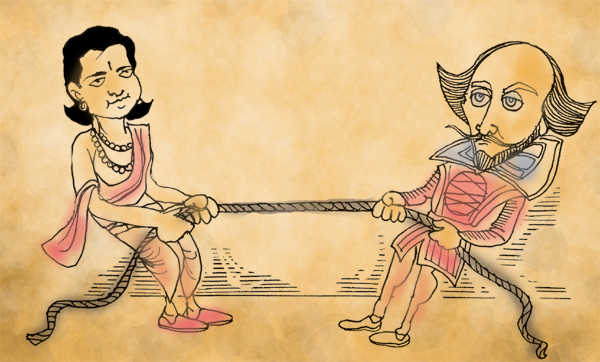INDIA is currently witness to a cultural battle in its universities and schools about what is to be taught and what is not. The ruling dispensation wishes to alter the existing curriculum to suit their ideology.
Among the half-truths in circulation about our school curriculum is that it does not dwell on the greatness of our heritage. It does not highlight "our" writers, "our scientists", and so on. Even a Shashi Tharoor fell into this trap when he lamented that while Shakespeare was taught in schools, Kalidasa wasn't.
The Shakespeare-Kalidasa charge falls flat when one looks at the facts. Shakespeare and Kalidasa, owing to the fact that they wrote in different languages, will obviously be studied separately. A study of English literature will include Shakespeare whereas Sanskrit literature will include Kalidasa. If more students know more about Shakespeare than Kalidasa, the stress on English education is to blame, not the "neglect" of "our" writers.
The reasons for an English education preference are due to the fact that it enables people to obtain jobs in the technology sector, academia and also facilitates migration. Our vernaculars are themselves in danger from English. The fate of a little-used language like Sanskrit whose use is limited is bound to be too. It is an issue of economic concerns and the dubious effects of colonialism. Contrary to perception, Indian writers are studied when students study Indian languages. A Hindi textbook will include Tulsidas, Mirabai, Kabir and others. A Sanskrit textbook is bound to include Kalidasa. History is another subject that ignites extreme passions. Some areas have been debated extensively. There is the Aryan Invasion Theory. This is much ado about nothing. This theory has been written out of our history books a while ago. The decline of the Indus Civilisation is no longer attributed to the Aryan invasion.Due to fresh evidence,historians have altered their earlier narrations. Schoolbooks talk of a possible migration or more rightly, several migrations of proto Indo-Aryan speakers who may have co-existed with Indus people before going on to dominate the "Vedic Age". The contention that the Indus people and the Vedic peoples were the same is still a matter of debate and for the moment, there can be no change in school textbooks. The columnist, Tavleen Singh, among others has made the accusation that our schools teach Greek, Roman and English History in preference to our own. This is erroneous too. The National Curriculum Framework 2005 (NCF 2005) clearly states that that a focus on Indian history coupled with some world history is what is recommended. In the CBSE system, formal historical studies begin only in Class 6. Class 6 is devoted to ancient Indian history, Class 7 to the medieval and Class 8 to the modern. In Class 9 and 10, there is some world history. CBSE books and many state education department books follow the NCF in letter and spirit. Deviations are some times found in international schools which follow the GCSE and IB curriculum. Those who claim to be outraged are clearly barking up the wrong tree.
The charge that ancient India's scientific contributions have not been recognised too needs to be understood in context. Science and mathematics have largely become part of the western knowledge corpus since the Enlightenment. Non-western contributions have definitely been short-changed. The case for a more inclusive history of science exists, but it is up to us to write it. The writing will have to be rigorous and well-researched. Once done, a case can be made for school students being taught the history of science which gives sufficient place to ancient Indian contributions. The entry of Islamic invaders to India and their "contributions" or "destruction" is perhaps the most controversial topic of them all. Here, the issue of "ours" and "not ours" is displayed in all its vulgarity. Our Islamic heritage is sought to be disowned because Islam is not an indigenous construct, but came from the Arabian Peninsula. The temple-breaking exploits of Islamic rulers are recounted in a masochistic fashion to create a sense of Hindu "victimhood". There is no attempt to understand things in relation to power politics, temples as economic institutions and so on. It's a mathematical exercise that merely tallies the temples destroyed.
Parallelly, we are happy to crow about the fact that the Indian cultural sphere included South-East Asia during the Chola rule and extended up to Afghanistan for much of our history. Did it perhaps destroy the local cultures there? That question is met with silence and the contradiction does strikes none as hypocritical. Another eerie silence is maintained about the treatment of Dalits and tribal populations throughout our history. Is there a case for a mathematical exercise there as well?
While there is much that the self-proclaimed victims want to exclude, they have no ideas about what should be included. Can we introduce Indian philosophical thought in our schools? Won't it be more valuable than 'Moral Science' or 'Life Skills'? This debate hasn't even begun. Are Indian philosophy's accommodative ideas in contrast to the belligerent mood of our "nationalists" who see in monochrome?
Our school books should not be employed in the service of an aggressive nationalism that stokes victimhood and wants brutal retaliation for 500-year-old happenings. The focus ought to be on knowledge creation and research and not on taking potshots at shadows. That is truly the “Indian” way.
The writer taught history to high school students for 10 years and is now an Editor with a publishing firm. The views expressed are personal.
Unlock Exclusive Insights with The Tribune Premium
Take your experience further with Premium access.
Thought-provoking Opinions, Expert Analysis, In-depth Insights and other Member Only Benefits
Already a Member? Sign In Now











